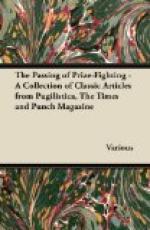* * * * *
I wish I could feel as enthusiastic about The Booming of Bunkie (JENKINS) as Mr. Peter McMunn, who, falling off a motor-cycle, landed in that quiet Scots village and proceeded to turn it, by a series of stunts, into a well-known watering-place. He undertook the job, I gather, partly for a joke and partly for the bright eyes of Evelyn Kirbet, whose father put up the money for the purposes of publicity and propaganda. The transformation of a hamlet into a seaside resort has been treated as a sort of psychological romance by Mr. OLIVER ONIONS in Mushroom Town, where the human beings are a background as it were for the bricks and mortar; Mr. A.S. NEILL, having chosen to make a farce of it, has provided a hero who believes in humorous advertisements, and has evidently persuaded the author to take him at his own valuation. This is hardly to be wondered at, since Mr. McMunn seems always keener on popping his puns than on selling his goods. Specimens are given of speeches, press articles, posters and cinema productions, but the fun rages with the most furious intensity round the golf links, where eighteen holes have been compressed into the usual space of one and the winner stands to lose drinks. There are also some parodies of ROBERT BURNS, some jokes about bathing-machines and some digs at the Kirk. One has been, of course, before to seaside places that were a bit too bracing, and I am afraid that the air of Bunkie leaves me cold.
* * * * *
I really think that The World of Wonderful Reality (HODDER AND STOUGHTON) may come to be something of a test for your true follower of Mr. E. TEMPLE THURSTON. You recall the ingredients that went towards the first, or Beautiful Nonsense, book? Sentiment in the slums, Venice with a very big V and poverty passim might be regarded as its composition. Well, here you have John and Jill home again; no more Venice, a palpably decreasing sentiment and only poverty to fill up with. I am bound to confess that I found John’s protracted




